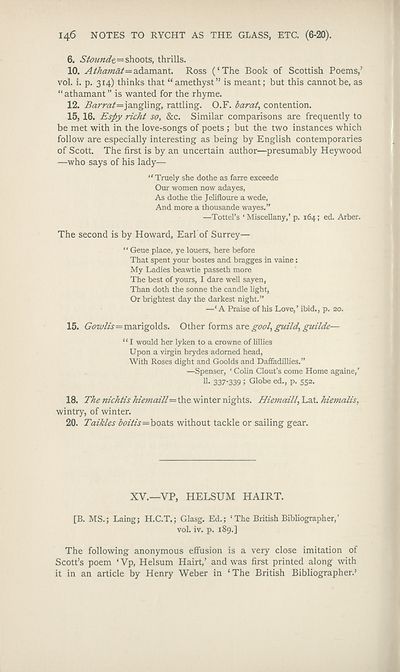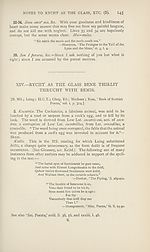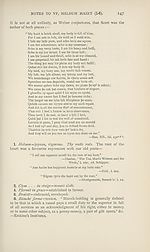Download files
Complete book:
Individual page:
Thumbnail gallery: Grid view | List view

146 NOTES TO RYCHT AS THE GLASS, ETC. (6-20).
6. Sfound?,—shoots, thrills.
10. ^2adamant. Ross (‘The Book of Scottish Poems,’
vol. i. p. 314) thinks that “amethyst” is meant; but this cannot be, as
“athamant” is wanted for the rhyme.
12. Barrat=)a.og\mg, rattling. O.F. barat, contention.
15, 16. Espy richt so, &c. Similar comparisons are frequently to
be met with in the love-songs of poets ; but the two instances which
follow are especially interesting as being by English contemporaries
of Scott. The first is by an uncertain author—presumably Heywood
—who says of his lady—
“ Truely she dothe as farre exceede
Our women now adayes,
As dothe the Jelifloure a wede,
And more a thousande wayes.”
—Tottel’s ‘ Miscellany,’ p. 164; ed. Arber.
The second is by Howard, Earl of Surrey—
“ Geue place, ye loners, here before
That spent your bostes and bragges in vaine:
My Ladies beawtie passeth more
The best of yours, I dare well sayen,
Than doth the sonne the candle light,
Or brightest day the darkest night.”
—‘A Praise of his Love,’ ibid., p. 20.
15. Gowlis = marigolds. Other terms axe goal, guild, guilds—
“ I would her lyken to a crowne of lillies
Upon a virgin brydes adorned head,
With Roses dight and Goolds and Daffadillies.”
—Spenser, ‘ Colin Clout's come Home againe,’
11. 337-339 ! Globe ed., p. 552.
18. The nichtis hiemaill — the winter nights. Hiemaill, Lat. hiemalis,
wintry, of winter.
20. Taikles boitis=boats without tackle or sailing gear.
XV.—VP, HELSUM HAIRT.
[B. MS.; Laing; H.C.T.; Glasg. Ed.; ‘The British Bibliographer,’
vol. iv. p. 189.]
The following anonymous effusion is a very close imitation of
Scott’s poem ‘Vp, Helsum Hairt,’ and was first printed along with
it in an article by Henry Weber in ‘The British Bibliographer.’
6. Sfound?,—shoots, thrills.
10. ^2adamant. Ross (‘The Book of Scottish Poems,’
vol. i. p. 314) thinks that “amethyst” is meant; but this cannot be, as
“athamant” is wanted for the rhyme.
12. Barrat=)a.og\mg, rattling. O.F. barat, contention.
15, 16. Espy richt so, &c. Similar comparisons are frequently to
be met with in the love-songs of poets ; but the two instances which
follow are especially interesting as being by English contemporaries
of Scott. The first is by an uncertain author—presumably Heywood
—who says of his lady—
“ Truely she dothe as farre exceede
Our women now adayes,
As dothe the Jelifloure a wede,
And more a thousande wayes.”
—Tottel’s ‘ Miscellany,’ p. 164; ed. Arber.
The second is by Howard, Earl of Surrey—
“ Geue place, ye loners, here before
That spent your bostes and bragges in vaine:
My Ladies beawtie passeth more
The best of yours, I dare well sayen,
Than doth the sonne the candle light,
Or brightest day the darkest night.”
—‘A Praise of his Love,’ ibid., p. 20.
15. Gowlis = marigolds. Other terms axe goal, guild, guilds—
“ I would her lyken to a crowne of lillies
Upon a virgin brydes adorned head,
With Roses dight and Goolds and Daffadillies.”
—Spenser, ‘ Colin Clout's come Home againe,’
11. 337-339 ! Globe ed., p. 552.
18. The nichtis hiemaill — the winter nights. Hiemaill, Lat. hiemalis,
wintry, of winter.
20. Taikles boitis=boats without tackle or sailing gear.
XV.—VP, HELSUM HAIRT.
[B. MS.; Laing; H.C.T.; Glasg. Ed.; ‘The British Bibliographer,’
vol. iv. p. 189.]
The following anonymous effusion is a very close imitation of
Scott’s poem ‘Vp, Helsum Hairt,’ and was first printed along with
it in an article by Henry Weber in ‘The British Bibliographer.’
Set display mode to: Large image | Zoom image | Transcription
Images and transcriptions on this page, including medium image downloads, may be used under the Creative Commons Attribution 4.0 International Licence unless otherwise stated. ![]()
| Publications by Scottish clubs > Scottish Text Society publications > Old series > Poems of Alexander Scott > (174) |
|---|
| Permanent URL | https://digital.nls.uk/106969267 |
|---|
| Description | A collection of over 100 Scottish texts dating from around 1400 to 1700. Most titles are in Scots, and include editions of poetry, drama, and prose by major Scottish writers such as John Barbour, William Dunbar, Gavin Douglas, and George Buchanan. Edited by a key scholarly publisher of Scotland's literary history, and published from the late 19th century onwards by the Scottish Text Society. Available here are STS series 1-3. |
|---|

